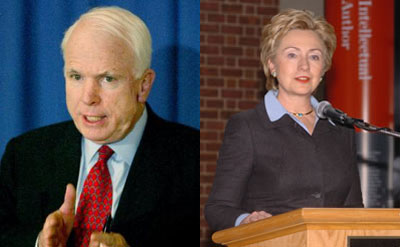Presidential candidates and space policyby Donald A. Beattie
|
| In past presidential races, if candidates had a space position it might be released late in the campaign marathons. Usually they were quite general in their content. |
An interesting result of the meeting of Senator Clinton’s supporters was a call for balance in our civil space programs. This is a good position to start from, for balance should mean that NASA programs, such as aeronautics, would once again receive a share of NASA’s budget that would permit it to conduct pioneering research for the benefit of one of our most important business sectors, the aviation industry. It means conducting missions in Earth orbit to understand how to protect our home planet. It means that, for space exploration, the challenge is to send missions beyond our immediate neighborhood in the solar system, where important questions remain to be answered.
The major issue that the next president must confront, when finally getting around to a serious review of NASA programs, is whether or not human space flight should continue to dominate NASA budgets. Or, should NASA’s research portfolio be more balanced? If the next president follows the advice of senior NASA managers, or the usual cast of characters that become involved in recommending civil space programs, human space flight will probably continue to receive the largest fraction of NASA’s budget.
Why will that be true? Because much of NASA’s infrastructure is already committed to supporting human space flight, and many senior management positions in government and industry have been filled with former astronauts who are predisposed to favor human space flight. Former astronaut Michael Coats, now director of the Johnson Space Center, stated at the National Space Society’s 26th Annual International Space Development Conference in Dallas last month: “There is no doubt that humans will return to the Moon. The only question is which humans… which country will send them… what values will they bring?” Such a statement clearly shows the mindset of those who advocate returning astronauts to the Moon and who will try to instill fear in the minds of decision-makers to assure continued human missions to the Moon.
What was Coats implying? That if Russia or China sends its citizens to the Moon it will result in some type of closed colony, or a presence that would threaten us? Such nonsense. The political environment that prompted the Apollo program no longer exists. Certainly we do not agree with the political philosophies that govern Russia and China, and military threats still abound. However, the former overt challenge of world domination by communism no longer requires a response by demonstrating our technological superiority in space. Rather, overall political, economic, and technological leadership must be shown in many areas, space being just one. We have already demonstrated we can send sophisticated robots and astronauts to the Moon. Let others try to catch up to what we accomplished more than 30 years ago. There is no need to become concerned or involved in another race to the Moon. There are much bigger space prizes to be won where we have shown technological leadership and where our astronauts can also lead the way.
| The former overt challenge of world domination by communism no longer requires a response by demonstrating our technological superiority in space. Rather, overall political, economic, and technological leadership must be shown in many areas, space being just one. |
Here is a suggestion for our next president. Offer the space community a choice. After reaching agreement with the Congress, NASA budgets over the next ten years would include $100 billion to either: 1) return humans and robots to the Moon, or: 2) expand exploration of Mars and our solar system, including funds to develop enabling technology to send humans to Mars. Splitting the funds between these alternatives would not be permitted. Anyone care to predict what the choice would be? Our future space program should be concerned with identifying and pursuing the highest priority programs. There will never be enough funds available to do everything the nation thinks is important.
